Rare CONFEDERATE Charleston Mercury SC Civil War 1865 Necessity Print Newspaper
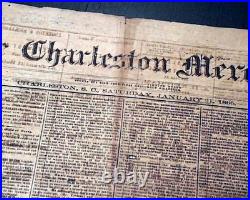
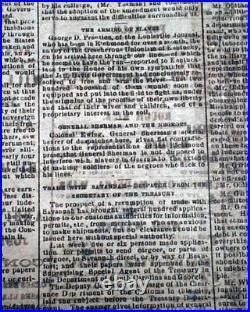
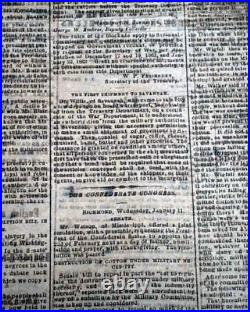
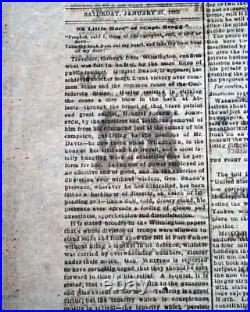
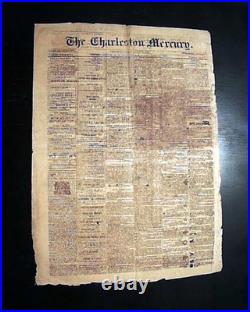
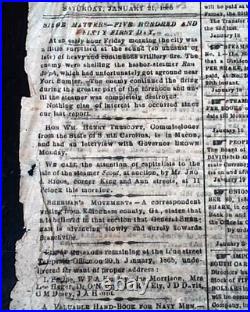
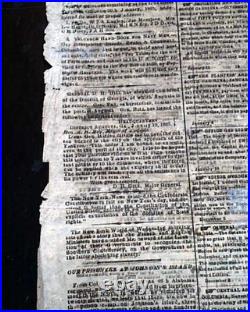
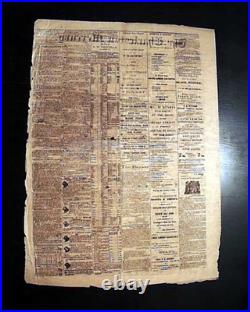

Rare CONFEDERATE Charleston Mercury SC Civil War 1865 Necessity Print Newspaper. Offered is an original, collectible newspaper (NOT a copy/reproduction): THE CHARLESTON MERCURY, South Carolina, Jan. From the origin of the Civil War Close to Confederates evacuating.
A newspaper from this famous Confederate stronghold quite late in the Civil War, in fact, our records seem to indicate this is the latest-dated issue of the Mercury we have offered from the Civil War. Just 3 weeks later General Beauregard would order the evacuation of the remaining Confederate forces from the city. On February 18 the mayor would surrender Charleston to Union forces. Among the articles: A Little More of Capt. Bragg" "Sentiments of the State of Texas" "The Confederate Congress" "Latest From the United States" "General Sherman & the Negroes" "The Arming of Slaves" "Our Prisoners on Johnson's Island and so much more.
A single sheet issue printed on "necessity paper", meaning not typical newsprint but rather a browning, thin, wrapping paper-like newsprint. It was typical with late-dated newspapers from the Confederacy that they used atypical paper for printing as regular newsprint was very scarce in the South. Untrimmed margins, irregular at the right margin, two small holes which seem to be due more to paper weakness rather than rare, foxing to a portion of the front page, an archival mend to the central fold of the back page.
Confederate "necessity" newspapers were an improvised product of the South's material shortages during the Civil War, when the Union blockade cut off access to quality paper and ink; as a result, publishers resorted to printing on whatever was available, producing issues now prized as artifacts of wartime desperation. Some of the most striking examples were printed on the blank side of wallpaper, such as the Vicksburg Daily Citizen during the 1863 siege, while others used coarse brown wrapping paper, lined writing sheets, or even scraps of official documents. These makeshift editions, often crude in appearance, still carried war reports, political commentary, and local notices, and their very form underscored the economic strain and resourcefulness of the Confederate press under blockade conditions. Today, they are highly collectible not only for their content but also for the powerful symbolism of a society struggling to maintain communication and morale amid scarcity.Please Note: All of our offerings are 100% authentic! We do not offer reprints or reproductions of any kind. They are guaranteed to be original! Links to Archival Storage Options & Certificates of Authenticity Are Below!
Historical reports may be beautiful or ugly, but they are always informative. While we rejoice in the beautiful heroic, discovery, amazing feats, etc. , we at History's Newsstand also offer "the ugly" for we are determined to learn from the wrongs of the past - understanding, to do so, we must be willing to look these wrongs directly in the face and shout NO MORE! It is for this reason many Black Americans collect historic slave ads, Jews collect reports regarding the Holocaust, women collect coverage of the Women's Suffrage Movement, etc..
If you find any to be offensive, we agree! Hopefully this is an indication we are moving in the right direction. For this specific item, A U. The S&H will be calculated by using the highest item's S&H as the base cost, and then adding a small amount for each additional newspaper.
The per-item additional cost for newspapers, folders, portfolios, and presentation cases vary according to size and weight. We will still provide tracking and insure them at our expense. Are not included in our quoted S&H. If You Are Unhappy With Your Order. We have been both collectors and dealers in rare newspapers since 1975, serve as consultants to multiple museums, and are members of both the Ephemera Society of America and the American Antiquarian Society. Knowing every item we offer is guaranteed to be authentic. Timothy Hughes Rare Newspapers P. Desiring to conduct ourselves honorably in all things. Were it left to me to decide whether we should have a government without newspapers, or newspapers without a government, I should not hesitate a moment to prefer the latter.